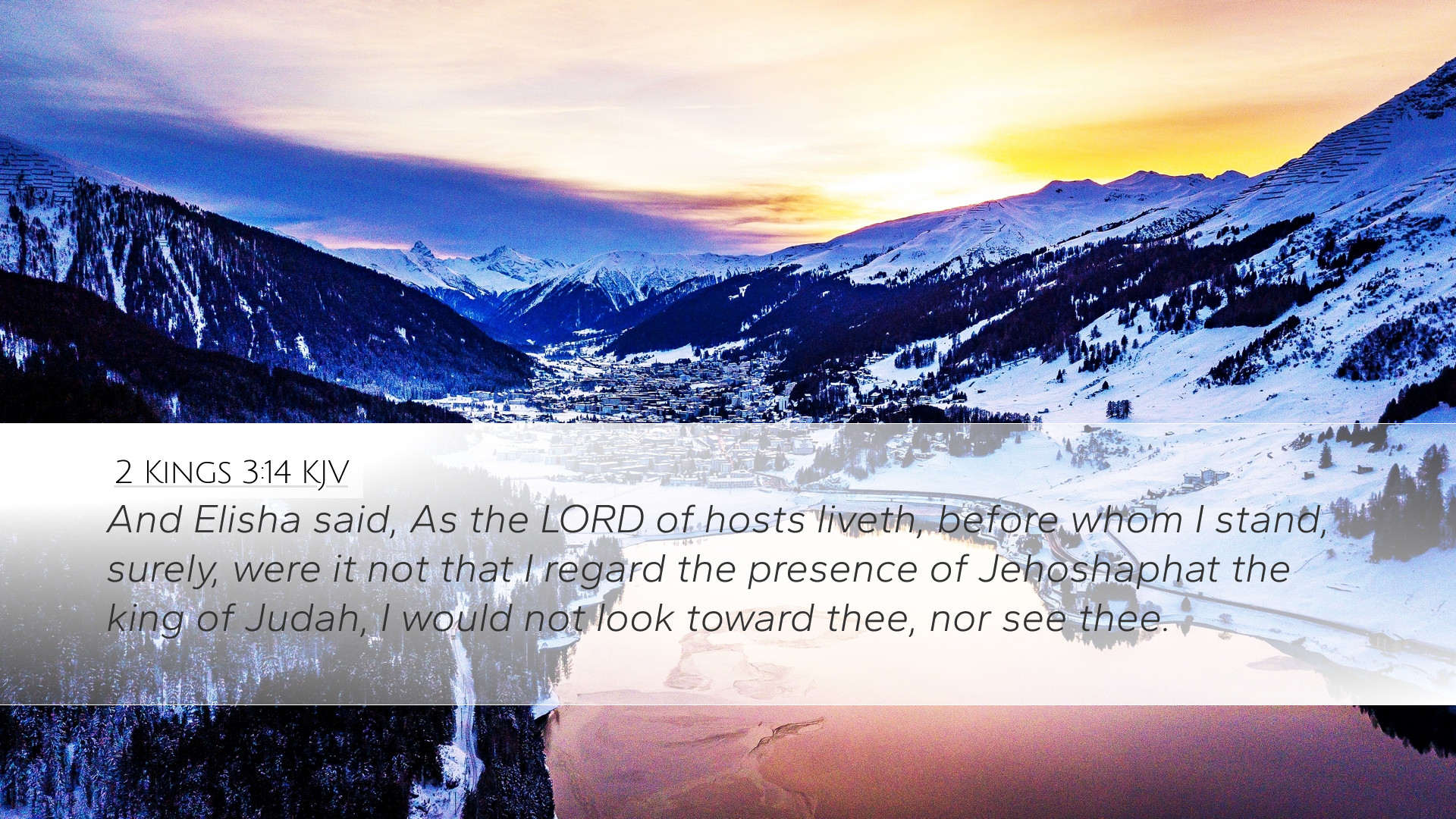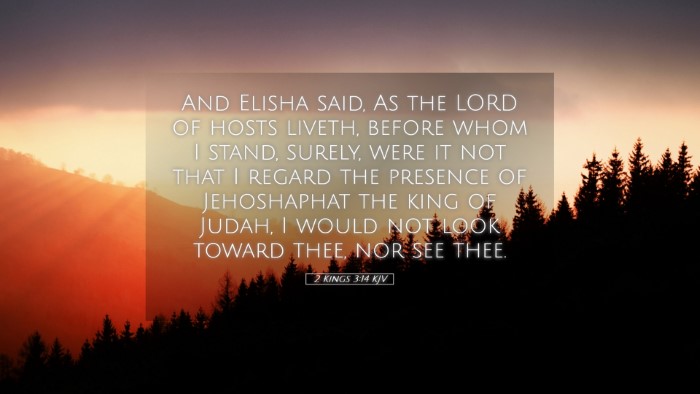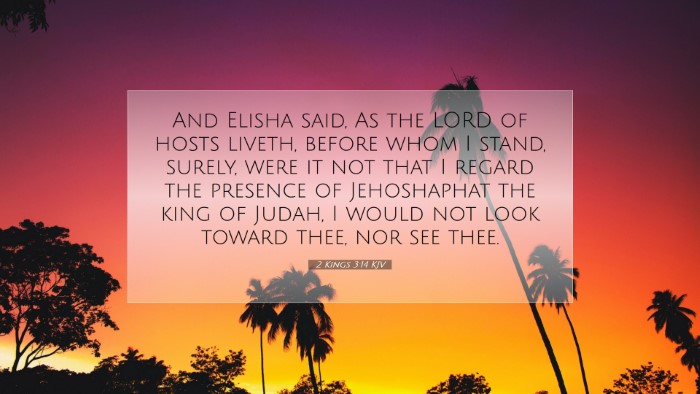Commentary on 2 Kings 3:14
Verse: 2 Kings 3:14 - "And Elisha said, As the Lord of hosts liveth, before whom I stand, surely, were it not that I regard the presence of Jehoshaphat the king of Judah, I would not look toward thee, nor see thee."
Introduction
The narrative surrounding this verse finds its context within a tumultuous period for Israel and Judah. Elisha the prophet, who succeeded Elijah, finds himself amidst a coalition of kings facing a dire situation against Moab. The verse is pivotal as it highlights Elisha's unwillingness to engage with the king of Israel, Jehoram, due to his unrighteousness, while showing respect for King Jehoshaphat of Judah. This commentary synthesizes insights from various public domain sources, aiming to glean practical and theological wisdom from this historical account.
Historical Context
Understanding the historical backdrop is essential to appreciating the nuances of Elisha's declaration. During this era, Moab revolted against Israel's dominion after Ahab's death, leading to a military campaign by Jehoram, the king of Israel, alongside Jehoshaphat, the king of Judah, and the king of Edom.
- Israel's Moral Condition: Jehoram's actions reflected a departure from the covenantal fidelity expected of Israel's kings, exhibiting a blend of idolatry and reliance on false prophets.
- Judah's Leadership: In contrast, Jehoshaphat, who had sought to uphold the worship of Yahweh, is significant in this narrative as he represents a desire for righteous governance, which plays into how Elisha responds.
The Nature of Prophetic Ministry
Elisha serves as a beacon of God's truth amidst wayward leadership. The phrase "As the Lord of hosts liveth" emphasizes the prophet's commitment to divine authority over political allegiance.
- Prophetic Integrity: Elisha's initial refusal to acknowledge Jehoram underscores the necessity for prophets to remain uncompromised by political alliances or personal gain.
- Authority of God: By stating he would not even look toward Jehoram had it not been for Jehoshaphat, Elisha clarifies that divine authority has priority over earthly power.
Insights from Commentators
Various commentators provide rich perspectives on the implications of Elisha's statement and the broader context of divine agency in human affairs.
1. Matthew Henry
Matthew Henry emphasizes the distinction between the righteous and the unrighteous. He points out that Elisha's disdain for Jehoram was not merely personal but representative of a broader principle: God favors those who honor Him.
2. Albert Barnes
Barnes offers a perspective on the coalition of kings, suggesting that Jehoram's alliance with Jehoshaphat was inadequate without true dependence on the Lord. He explores the idea that Jehoram's lack of faith rendered him unworthy of prophetic insight.
3. Adam Clarke
Adam Clarke further explicates the dynamics of prophetic judgment, commenting on Elisha's willingness to act solely for Jehoshaphat's sake. He notes, "Elisha’s regard for Jehoshaphat shows the importance of righteous companionship in leadership." Clarke links this relational respect to the overarching covenantal faithfulness expected of the Hebrew kings.
Theological Implications
This verse serves as a reminder of the following theological truths:
- God's Sovereignty: God's authority is immutable; He operates within the framework of His will that transcends human governance.
- Divine Favor: The favor of God is linked with righteousness. Jehoshaphat's presence elicited God's attention in a time of crisis, drawing a stark contrast to Jehoram's unworthiness.
- Accountability of Leaders: This passage illustrates that leaders are accountable before God. Their commitment to Him determines the effectiveness of their endeavors.
Practical Applications
For pastors, students, theologians, and Bible scholars, this verse encourages several applications:
- Faithfulness in Leadership: Evaluate personal and communal contributions to leadership. Are our influences righteous, and do they align with God's calling?
- Seek God’s Guidance: Like Jehoshaphat, leaders should seek the Lord earnestly in times of distress, acknowledging Him before making decisions.
- The Nature of Prophetic Voice: Recognize the need for faithful voices in contemporary contexts—individuals who speak against injustice and call for repentance.
Conclusion
2 Kings 3:14 serves as a profound reminder of the roles of leadership, prophecy, and personal fidelity to God amid societal challenges. Elisha's reluctance to engage with an unworthy king emphasizes the necessity for those who claim divine authority to live in accordance with God's will. As we explore this text, may we seek to embody the principles of righteous leadership, honor our commitments to God, and recognize the importance of faithful prophetic voices in our communities.


